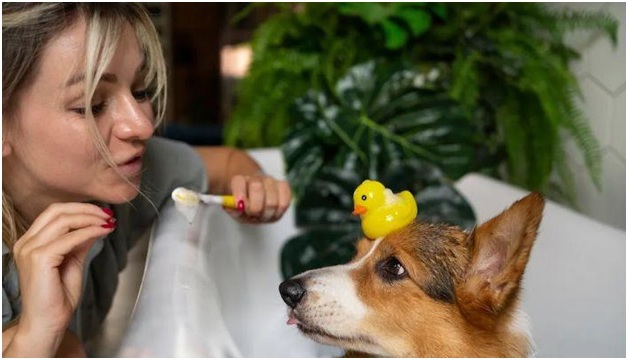Research indicates that eighty percent of dogs develop periodontal disease by the time they are three years old. This worrying fact emphasizes the importance of oral care for dogs. The following will analyze how good dental hygiene can impact on overall health of pets as well as give ideas about keeping their teeth clean which may help with energy levels and even mood swings. Additionally, we will provide handy tips and tools like ultrasonic toothbrushes that allow one to take care of their dog’s mouth from home.
Understanding Your Pet’s Mouth
But let us first have a look inside your dog’s mouth before we get into dental issues. As with people, dogs have four different kinds of teeth:
- Incisors for biting off pieces
- Canines for tearing meat apart
- Premolars help crush bones or hard food items into smaller bits so they’re easier to swallow
- Molars at the back which are used mainly in grinding up food
These teeth are all supported by tough gums.
Common Dental Offenders: What Can Happen?
Unfortunately, there are many common issues when it comes to dogs’ dental health; here are just some examples:
Periodontal Disease
This condition is among the more serious ones that may damage a dog’s gums and teeth. First forming on the surfaces of teeth is plaque, a sticky covering mostly composed of bacteria. Gum irritation and gingivitis follow from plaque hardening into tartar if it is not eliminated. This can then progress into periodontitis where severe infection destroys both gum tissues besides supporting bone around affected teeth leading eventually to loss or extraction of those teeth altogether.
Tartar Buildup
Tartar (calculus) is simply hardened dental plaque that forms when minerals from saliva combine with leftover bits of food particles within the mouth cavity; it’s hard and ugly but more importantly may irritate gum lines thus creating additional complications down below!
Tooth Decay
Although less common than in people, cavities do occur among canines too. Sugary snacks as well as kibble lodged between close-set pearly whites without proper brushing could bring about this problem.
Broken Teeth
Dogs love playing around just like we do! However sometimes during their fun games, they might accidentally chip off part or even break the whole front tooth structure which will be painful not to mention an open door for infections if left untreated.
Why Brushing Works Best: Dental Care is Vital
You wouldn’t dream of skipping your dental routine, and the same should go for your furry friend. Here’s why:
Fresh Breath And Healthy Smile
- No one wants a face full of doggy breath! Brushing helps to remove food particles that are stuck in between teeth which could lead to bacterial growth causing a bad smell from the mouth; it also removes plaque thereby keeping their smiles shiny white.
Prevents Pain And Discomfort
- Dogs can have very painful teeth – much worse than ours. Brushing regularly prevents tartar buildup, which if not removed irritates gums leading to more serious conditions characterized by severe pain.
Reduces Risk Of Illnesses
- Studies have shown that dogs with poor oral health are more likely to suffer from heart disease, kidney infections, or diabetes among other illnesses. This means that maintaining good dental hygiene will help reduce these risks significantly.
Improves General Health
- When a dog’s mouth feels great so does he! Therefore taking care of his teeth too can contribute to enhancing overall well-being as well.
How Oral Health Affects Your Dog’s Whole Body
Do you think dental problems are just an inconvenience? Think again! There is a strong link between oral hygiene and general physical condition in dogs; here’s how:
Systemic Effects
Bacteria found within the mouth can spread throughout other parts of the body via blood vessels thus infecting organs such as heart valves leading eventually even death if not treated promptly enough.
Behavioral Changes
Canine discomfort resulting from toothache is often expressed through changes in behavior like refusal to eat anything hard or chew toys vigorously anymore because they hurt too much when doing so!
Emotional Upheaval
These animals share similar emotions with us humans meaning that if left unattended, severe tooth pains may cause depression besides anxiety attacks brought about by fear related directly to such situations.
Also Read: Is Acai Good for Dogs?
Keeping Pup’s Smile Gleaming White- Effective Home Care Tips
Here are some doable advice for keeping dogs’ teeth healthy now that you understand what’s at risk.
Brushing
Every day or many times a week, but use a dog toothbrush and toothpaste. It just as well be a finger brush! Start gently, exercise patience, and give your dog praise and goodies all along the way.
Dental Treats and Chews
Give dental snacks and chews to help clear teeth of plaque accumulation. Veterinary Oral Health Council (VOHC) stamp of approval goods are those that are effective against tartar and plaque.
Diet and Dental Dilemma: The Importance of What Your Dog Eats
For maintaining oral health in dogs, just as it is with humans, a healthy diet is crucial. Here’s how your dog’s food can affect its teeth and gums:
Sugary Treats
- These kinds of treats or snacks may encourage the growth of plaque bacteria – the sticky film that clings to teeth and causes tartar build-up.
- Limit the intake of sugar-filled treats for your furry friend and try frozen fruits/vegetables safe for them instead.
Kibble
- Although kibble helps scrape off some plaque when chewed by dogs, it might not remove all plaque or tartar, especially those found between their teeth.
- You could feed your dog wet food occasionally or use dental chews designed specifically for removing plaque.
Teeth-Friendly Diet
- Some brands produce dental-friendly kibbles that contain certain elements that help reduce plaque and tartar formation in dogs’ mouths.
- Always go for dry pet foods with the Veterinary Oral Health Council seal since these have been scientifically proven effective at reducing plaque/tartar on animals’ teeth.
Breed Predisposition: Some Pups Are More Prone to Problems
Just like humans are prone to various ailments depending on their genetics, so too are certain breeds susceptible to dental issues due to inherited factors linked closely with facial shape & form among other things. Below are reasons why a dog may be at higher risk for suffering from any number of dental problems:
Smaller Dog Breeds
Smaller-sized dogs often have crowded dentition, making it difficult to keep their teeth clean, hence increasing their chances of getting gum infections leading to periodontal diseases. This may necessitate frequent visits to veterinary dentists by owners of these pets.
Short-Nosed Breeds
Dogs such as pugs or bulldogs which exhibit brachycephalic characteristics including shortened snouts often end up having misaligned teeth besides overcrowding (Malmberg et al). This may affect their ability to chew food properly and clean teeth effectively.
Toy Breeds
Delicate teeth found in toy breeds can easily break or chip off, thus requiring extra care. Owners should be cautious when selecting chew toys for these dogs; they should avoid hard materials that could damage their pet’s dental structures.
Conclusion
It is important to remember that taking care of your dog’s teeth is just as important as taking care of your own. You can prevent dental pain and ensure a healthy mouth for many years to come if you follow some of the advice provided here such as regular brushing, dental chews, and a good diet. A lively pet needs to keep smiling brightly so don’t hesitate to implement these tips into your furry friend’s daily routine! Healthy dogs are happy; therefore, overall wellbeing will be improved by promoting oral health which in turn also means less chances for contracting severe diseases in canines besides keeping them active. Therefore start now with that canine toothbrush and a typical pup’s oral care regimen should begin today!





















